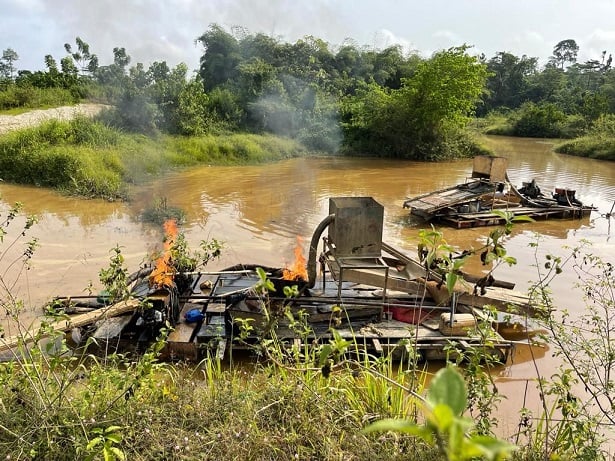The Eco Warriors Movement, an environmental group, has voiced their strong concerns regarding the recent actions taken by the military under ‘Operation Halt,’ wherein a total of 18 confiscated chang-fan machines and water pumping equipment used for illegal mining were burned. This controversial practice has raised alarm bells among environmental advocates, who argue that while the intent behind these operations is to combat illegal mining—an activity that has historically devastated the environment through water pollution, deforestation, and soil degradation—the method of destroying confiscated equipment poses significant environmental risks. Mr. Otuo-Akyampong Boakye, an Environmental Scientist and President of Eco Warriors, highlighted these dangers during an interview in Kumasi, emphasizing that the burning of machinery contributes to soil contamination and can have lasting impacts on the ecosystem.
Mr. Otuo-Akyampong explained that the burning of machinery releases hazardous materials such as petroleum residues, heavy metals like lead and mercury, and various toxic plastic compounds. These substances can seep into the ground and persist in the environment for extended periods, leading to detrimental effects on soil fertility. The unfortunate reality is that these toxic contaminants can make their way into the food chain, affecting crops and livestock, thus posing a public health risk to communities that rely on agriculture. His concerns underscore the complex and often overlooked environmental aspects of combating illegal mining through destructive means.
Historically, the government of Ghana has adopted a strategy of burning confiscated equipment as a deterrent to illegal mining activities, which has led to significant environmental degradation throughout the country. However, the Eco Warriors Movement is calling for a re-evaluation of this approach, urging the government to explore alternative methods for handling confiscated machinery. Suggestions put forward by the organization include safe dismantling and recycling of equipment, secure disposal of hazardous materials, and repurposing of the machinery, rather than resorting to incineration. Such strategies could mitigate the harmful environmental impacts associated with burning while promoting sustainable practices.
The group believes that adopting more environmentally responsible methods for dealing with confiscated equipment could ultimately lead to dual benefits: a reduction in illegal mining activities and the preservation of fragile ecosystems. Mr. Otuo-Akyampong emphasized that the group remains steadfast in its commitment to combating illegal mining, commonly referred to as “galamsey,” but stressed that efforts must prioritize the health of the environment to safeguard natural resources for future generations. The current practices, according to the group, represent a reactive response that does not address the root causes of illegal mining or its environmental consequences.
In his statements, Mr. Otuo-Akyampong called for the Ghanaian government and military to engage in a thorough review of the implications and efficacy of their current strategies regarding the destruction of illegal mining equipment. By shifting the focus towards a more sustainable and eco-friendly approach, the government can demonstrate its commitment not only to the immediate concerns of illegal mining but also to the long-term health of the country’s environment. This holistic viewpoint could pave the way for comprehensive strategies that balance the urgent need to tackle illegal mining with responsible environmental stewardship.
In conclusion, the Eco Warriors Movement has put forth a substantial argument emphasizing the significant environmental costs associated with burning confiscated machinery used for illegal mining. They advocate for a reassessment of current methods, proposing more sustainable practices that would protect both the environment and the integrity of Ghana’s natural resources. Mr. Otuo-Akyampong’s statements highlight the urgency of recognizing the interconnectedness of environmental health and socio-economic practices, urging policymakers to consider alternative solutions that can effectively address illegal mining while fostering a healthy ecosystem for present and future generations.


